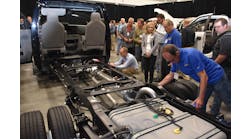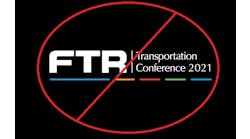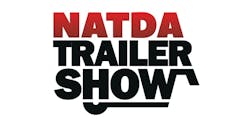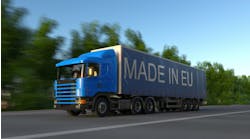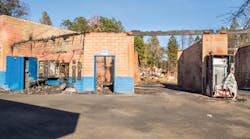When Ben Winter’s presentation during the NTEA Distributor Innovation Conference was scheduled, the world had never heard of the novel coronavirus. But by the time the Work Truck Show rolled around in early March, COVID-19 had gained a foothold in the US. Still, even as Winter—an NTEA board member and director of business development and head of sales for Transfer Flow Inc—detailed how corporate culture enabled Transfer Flow to sustain operations during a disaster, few if any people in the packed conference room likely realized how timely the presentation would be.
That presentation, “Team Building for the Future,” was essentially a playbook for long-term business success, a variation on the “six critical questions” from Patrick Lencioni’s popular management book.
But the real message underlying the business basics was more subtle, and the Transfer Flow experience is a case study for this time of pandemic and economic crisis. Simply, if a business is going to last, it’s going to have to face and survive some unexpected challenges that would ruin most companies.
Transfer Flow, an automotive manufacturing company that focuses on fuel systems, OEM fabricated parts, and tube and hose specialties, is located in Chico CA, about 90 miles north of Sacramento. As of this spring, the company had 110 employees, working in two shifts in the company’s 70,000-square-foot facility.
“We have a pretty strong and stable family ownership and executive board. When we’re building these teams, we try to do it so that it’s a balance—we’re a balanced team,” he said.
To create that executive team, Transfer Flow uses different staffing tools such as the CliftonStrengths assessment and the Myers Briggs personality test.
“What we’re trying to do is find that balance: relationships, strategic thinking, the executing of plans, influencing,” Winter said. “If you’re too heavy on one side or the other, you’re never going to move that company to the next level.
“We’ve come up with a kind of team mission, a rallying cry,” he continued. “It’s to satisfy the customer, do the right thing, and seek to innovate. So those are the things, if we ever get off track or off-balance, the executive team can always come together. And you can always focus on your critical questions.”
Specifically, Transfer Flow’s “Focus on the Future” keys to success are:
1. SATISFY THE CUSTOMER
A. Ask
B. Listen
C. Act
2. DO THE RIGHT THING
A. Safety
B. Quality
C. Legal
D. Trust
E. Support the community
3. SEEK TO INNOVATE
A. Technology/Tools/Technique
B. Continuous Improvement
C. Humble, Hungry and Smart
D. Best Practices
“At any time, anybody in the organization knows exactly what our goals are, and how we’re going to get to that,” Winter said. “So if it’s profitability, if it’s revenue, whatever that might be, you’re going to be able to go to that board and say, ‘We’re going to do this because of these things.’ And that’s really helped the whole organization, going all the way up through our reporting to the board of directors.”
The disaster
But that structure was put to the test in November 2018 when a faulty power transmission line sparked in Northern California’s Butte County. By the time the resulting Camp Fire had burned out, it was the deadliest and most destructive in the state’s history. Insurance losses made it the most expensive natural disaster in the world for 2018.
The Camp Fire wiped out the neighboring community of Paradise, just east of Chico, consuming more than 150,000 acres in the Sierra foothills and destroying nearly 15,000 homes and commercial structures. In less than 24 hours, 50,000 people in the area were homeless.
To drive the desperation home, Winter’s presentation included a photo of a tent village that popped up in a field next to the Chico Walmart; the sky is gray and thick with smoke.
And the fire impacted 30% of Transfer Flow employees or their family members who needed housing.
“It changes the dynamics of the culture,” Winter said. “It changes the dynamics of how you can have a house, where you live, how you run a company. But my customers outside of Chico still need product; the OEMs still need their lines to run. How are you going to handle this?”
Revenue and profitability projections? Out the window. The focus became finding the basic necessities for the community and employees. Winter called it “survival mode.”
“How are we going to get 30% of our staff back working when they’ve lost everything and we’ve got to keep that line moving? We immediately took our profits, we took any revenue that we had based, and we sucked it into renting trailers,” he said. “We went out and just wrote open-ended checks so that they could buy clothing, personal effects, deposits to get into a home. Anything to let them try to start rebuilding as quickly as they can from a total loss.”
This wasn’t charity, however; this was a necessary retention strategy. As Winter explained, if skilled workers left, they would be even harder to replace than usual: No one from outside the area could move in because there was nowhere to live. And, suddenly, there was “a lot of insurance money floating around,” so people had the option to take that money and settle elsewhere. And just as suddenly labor was in high demand for debris removal and construction at increasing levels of pay.
“We were having employees try to leave, so we had to change our wages to retain that skilled labor and keep the facility running,” Winter said. “This is a side-step from everything that our executive team has been working on. Now we’re continually talking about everything that’s going on in the community, how the money is being distributed, how our sales are doing to support all of this. Because we’ve seen a lot of companies dissipate: They can’t find labor. They put their money in the wrong spot. They weren’t prepared for something like this.”
Back to basics
And this is where the guiding principles prove their value. But now ‘innovation’ isn’t about new products or processes, it’s about surviving the crisis.
“One thing we will always do is try to make decisions that are focused on ‘hungry, humble and smart,’” he said. “That’s a pretty broad three words, but they’re pretty powerful. It just means having the right people at the right job. We’re in the right spot. We’re making the right decisions. And we’re pushing the company forward.”
Indeed, every decision could still be guided by the “rally cry,” the path to success. But, with the disaster, leadership had to focus on matters of community survival while still maintaining the focus on the customer.
In closing, Winter emphasized one key takeaway: “You have to have a team where you can have open candor,” he said. “You can get into a raw discussion, you can make some uncomfortable decisions—but you can leave that boardroom and you can still work together.
“It’s not personal; you can’t take a personal approach into what’s happening in that boardroom—and I’ve seen that so many times over my almost 30 years in this business. You have to have the right people that can go through that then leave the room and still run the business. It’s vital.”




